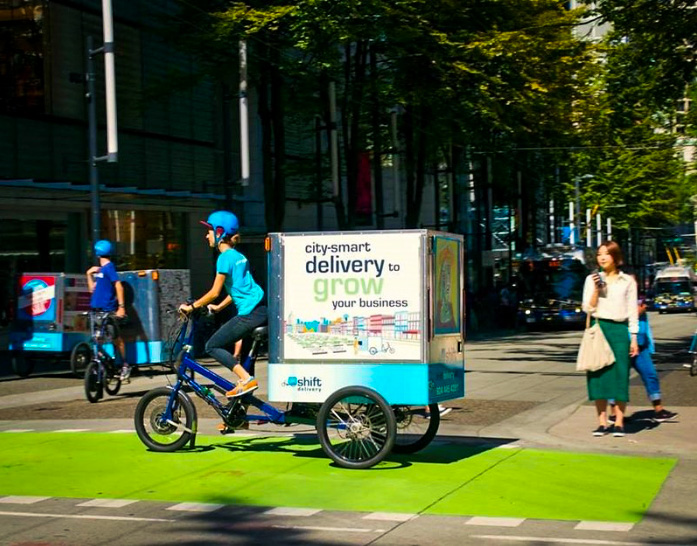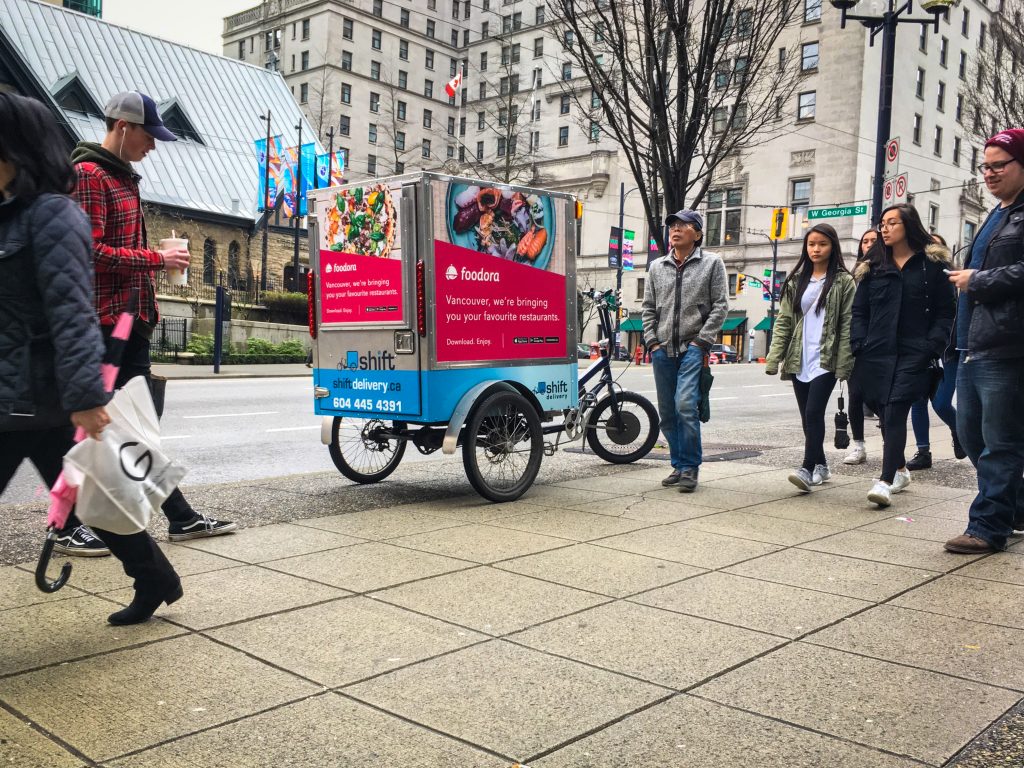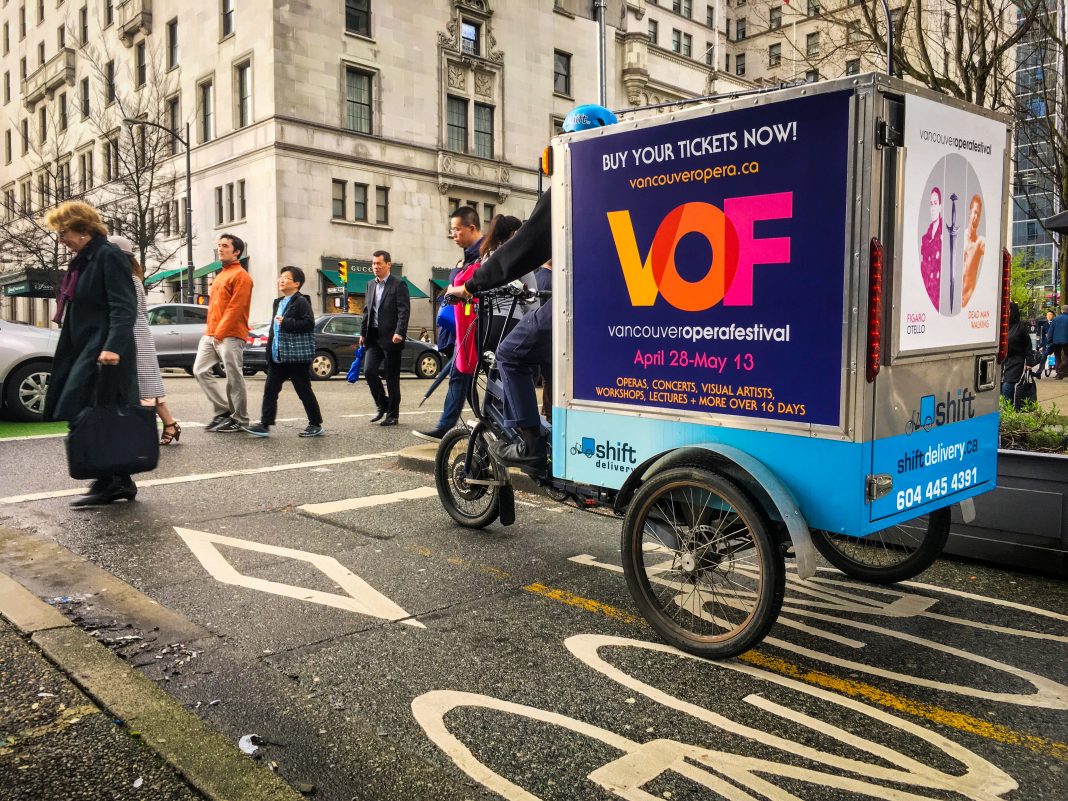In the highly competitive logistics business environment, Shift Delivery is taking delivery trucks off, and cargo trikes onto Vancouver’s streets. All by putting community over profit. Here’s what it means to deliver goods the good way, even in times of crisis!
The Canadian City of Vancouver is home to Shift Delivery, a logistics company specialising in last mile delivery with cargo tricycles or trikes. Shift is organised as a worker-owned co-op, which means that its members own and democratically operate it together. In the notoriously competitive and insecure gig industry, a delivery company putting employees over profit is the proverbial exception that proves the rule.
What differentiates Shift Delivery from other delivery companies? Who makes decisions and how is it possible to move forward? What does moving forward even mean?
An Ethical Community Driving the Greening of the City
Large logistics businesses are typically shareholder driven. Corporate decisions must keep shareholder value in mind; return of investment (ROI) is key. This means that societal or environmental concerns generally follow the profit motive: Only if there’s more shareholder value to generate from green services, will the latter trump traditional ones. Unless investors go green, dependence on shareholder value slows down any transition significantly.
Cooperatives work differently. Employees of a co-op are stakeholders and as such, they are primarily interested in the long-term success of the organization, not in ROI. What drives and unites Shift’s employees is their belief that green (green vehicles, green deliveries) is not just sustainable but also ethical and therefore the right thing to do. This mindset is also reflected in the co-op’s official vision, which is “to be collaborative trailblazers for a healthy, resilient world”. Put differently, it’s about much more than just moving goods. It’s about a community of like-minded people driving the greening of the city by moving goods in a good way.
“When you work at Shift, you kind of have to accept that the community comes first”.

Marc Baumann, one of the company’s co-owners, emphasises that, at Shift, “it’s not about egos and positions and titles”, but rather about the wellbeing of each member, a shared vision and a common mindset. “When you work at Shift, you kind of have to accept that the community comes first.”
And the co-op is doing everything to create a positive working environment where each individual is valued and can develop to the full. Money is probably not the number one reason for becoming a member, but still a critical aspect. Marc is clearly proud of the fact that a so-called triker gets paid better than the average delivery company employee. At Shift, the hourly starting wage is $16; other companies only pay $14.
While this all sounds great, Marc admits that the organisational model presents some challenges: At the co-op, everyone has an equal say. Despite their shared vision, members still have unique personalities, different opinions, and competing ideas on how things should be done. Discussions are inevitable. But while decisions are typically harder to achieve, they ultimately stick: They “work better for everyone”, as Marc puts it. Joint decisions also guarantee that no one person has to cope with the pressure and responsibility alone.
“If you book deliveries with Shift, you always basically have in mind that it is a co-op and that is supporting the whole community of people. And I think that’s also mirrored in our customer base with a lot of socially oriented or greener companies.”
Shift Delivery is also serious about its business partners. Cooperating with a big retail chain that is knowingly underpaying its workers would go against Shift’s philosophy and is therefore not an option. Shift is not willing to make any compromise when it comes to corporate values and ethical standards.
Steering Through a Crisis Together
And still, there’ve been easier times for Shift. The current pandemic is a huge challenge. Like any other business, the cooperative still needs to make money to avoid laying off employees. Before the pandemic struck, Shift generated about a quarter of their income from advertising and promotions. This steady stream of income has literally come to a near standstill, “because you know, downtown is empty, and nobody wants to buy ad space on a tricycle that nobody sees”, explains Marc.

Apart from advertising, changes in the customer landscape have put Shift’s ability to adapt to the test. Some of Shift’s business partners were, all of a sudden, deemed non-essential. A dry-cleaning company no longer in need of Shift’s services is but one example. Grocery deliveries, on the other hand, surprisingly picked up. They presented Shift with a new challenge.
“We grew in the beginning of the pandemic and then we ran into some capacity issues. The sector of grocery deliveries became so big that our customer basically prefers a big van to load 60 deliveries instead of a trike with 12.”
What seemed promising at the beginning, soon grew too big. Currently, Shift has got 10 tricycles each carrying up to 230 kg, which limits the volume of goods that can be carried and delivered. And although Shift is trying to keep prices as competitive as possible, compared to other logistics companies their services are still more expensive.
But difficult times don’t automatically call for lay-offs. At least not at Shift. As a co-op, sharing both responsibility and burden is not just empty talk. It means finding new solutions and steering through crises together: “We basically did something really genius which I still like a lot […] having a vehicle filled with deliveries work as a hub,” Marc proudly explains. These temporarily set up ‘micro depots’ supported Shift’s existing warehouse and shortened the last mile considerably. Marc is convinced that, whether temporary or permanent, hubs will generally play a crucial role when it comes to keeping the big delivery trucks out of our city centres.
“Truck or Trike? You Can Choose”
The trademark question Shift keeps asking their community is, “Truck or trike? You can choose”. What is it that we really want? Do we want to put even more trucks on our streets and risk the health and wellbeing of our citizens and the environment, or do we choose the more sustainable path, which has us pay a tiny bit more for deliveries with zero tailpipe emissions?


